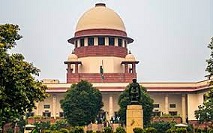New Delhi, November 6
The Supreme Court on Monday disapproved of governors sitting over bills passed by state assemblies, saying they must act before the matter reached the top court.
“Why does the party have to come to the Supreme Court? Governors act only when matters reach the Supreme Court. This has to stop. You come to the Supreme Court then the Governor starts acting. This shouldn’t be,” CJI DY Chandrachud said.
Pointing out that a similar situation had arisen in Telangana as well, where the Governor acted on the pending bills only after the state government filed a petition, the Bench said, “Governors should not be oblivious of the fact that they are not elected authorities.”
The CJI noted that the assembly was adjourned sine die on March 22, 2022 without being prorogued and it was reconvened. Pointing out that the budget session virtually merged with the monsoon session, the CJI wondered if it was the scheme of the Constitution.
“There is a little bit of soul searching to be done by both the sides…”We are the oldest democracy and these issues must be sorted between the Chief Minister and the Governor,” the CJI said.
Solicitor General Tushar Mehta informed the Bench that the Governor had taken “appropriate decisions” on the bills and said he would come up with the exact status of the bills by Friday.
Mehta said astonishing things were happening. “Never before has this happened in the constitutional history of the country. The assembly was deliberately not being prorogued and was being kept open to abuse people and claim privilege.”
On behalf of the state government, senior counsel AM Singhvi and Advocate General Gurminder Singh said important bills, including those relating to fiscal management, amendments to the GST, gurdwara management, etc, were pending with the Governor, affecting governance in the state.
Singh said four bills passed by the Punjab Assembly on July 24, 2023 were sent to the Governor but had not been dealt with by him under Article 200 of the Constitution.
On three bills, the Governor’s recommendation was sought and with regard to two of them he had already given recommendation, the Advocate General informed the Bench.
On behalf of the Kerala Government, senior counsel KK Venugopal told the Bench that a similar petition had been filed by the State of Kerala against the Governor.
“The Governor has not taken action on Bills passed for the welfare of the people…And after reports were published about the State filing the petition, he (Governor) says he will see it in the court,” Venugopal submitted. The Bench was likely to take up the Kerala Government’s petition on Friday.
Purohit has withheld his approval to the Punjab Fiscal Responsibility and Budget Management (Amendment) Bill, 2023, the Punjab Goods and Services Tax (Amendment) Bill, 2023, and the Indian Stamp (Punjab Amendment) Bill, 2023, which were to be tabled in the Assembly during the October 20-21 session.
The governor had said the October 20-21 session, which was projected as an extension of the budget session, was “bound to be illegal” and any business conducted during it “unlawful”. On October 20, the Punjab government had cut short its two-day session.
Four other bills — the Sikh Gurdwaras (Amendment) Bill, 2023, the Punjab Universities Laws (Amendment) Bill, 2023, the Punjab Police (Amendment) Bill, 2023, and the Punjab Affiliated Colleges (Security of Service) Amendment Bill, 2023 — are also awaiting the governor’s assent. These bills were passed during the June 19-20 session of the Punjab Assembly, which the governor had termed “patently illegal”.
The Punjab government has sought directions to the governor to grant his assent to all bills passed by the state assembly.
The governor cannot indefinitely sit over the bills as he has restricted powers under Article 200 of the Constitution, which deals with the governor’s power to give or withhold assent or reserve a bill for the President’s consideration, it submitted.
Purohit gave his assent to the Punjab Goods and Services Tax (Amendment) Bill, 2023, and the Indian Stamp (Punjab Amendment) Bill, 2023, on November 1.
But in his letter to the chief minister on October 19, the governor withheld his approval to three money bills. The governor’s approval is needed to table money bills in the House.
It’s the second time in a year that the AAP government in Punjab has moved the top court against the Governor. Earlier, it had moved the Supreme Court after accusing the governor of not “reverting” to the cabinet’s decision of summoning the budget session in March.



